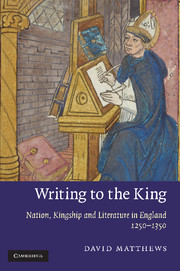Book contents
- Frontmatter
- Contents
- Preface
- Abbreviations
- Introduction
- 1 Defending Anglia
- 2 Attacking Scotland: Edward I and the 1290s
- 3 Regime change
- 4 The destruction of England: crisis and complaint, c.1300–41
- 5 Love letters to Edward III
- Envoy
- Appendix: The tail-rhyme poems of Langtoft's chronicle
- Notes
- Bibliography
- Index
- CAMBRIDGE STUDIES IN MEDIEVAL LITERATURE
4 - The destruction of England: crisis and complaint, c.1300–41
Published online by Cambridge University Press: 07 May 2010
- Frontmatter
- Contents
- Preface
- Abbreviations
- Introduction
- 1 Defending Anglia
- 2 Attacking Scotland: Edward I and the 1290s
- 3 Regime change
- 4 The destruction of England: crisis and complaint, c.1300–41
- 5 Love letters to Edward III
- Envoy
- Appendix: The tail-rhyme poems of Langtoft's chronicle
- Notes
- Bibliography
- Index
- CAMBRIDGE STUDIES IN MEDIEVAL LITERATURE
Summary
THE RISING THAT WASN'T
‘O domine mi rex’, wrote a priest near Windsor, addressing a letter to Edward III some time not long after the fall of Mortimer in 1330. He left no doubt about the work's addressee, repetitively beginning paragraphs with the formula, occasionally varying it with such phrases as ‘ego dico tibi’. The work that he produced is known by the general title of Speculum Regis Edwardi III and exists in two versions, A and B, probably written in 1331 and 1332 on either side of a treaty agreed at Amiens between Edward III and Philip VI of France. In both versions, the priest presents an image of a divided, unhappy England, the poor people oppressed and, but for the lack of a leader, prepared to revolt. Underlining this, he retells a story from 1 Kings 21.2–19, in which King Ahab forcibly possesses the vineyard of a man named Naboth, having first ensured Naboth's death. God sends Elijah to Ahab to announce to him: ‘In the place where dogs licked up the blood of Naboth shall dogs lick your own blood.’ The priest continues: ‘Therefore, I say to you, Lord King, that on account of the many kinds of injuries that your ministers did to paupers, the paupers were compelled to sell their lands, and they died in misery. And therefore, you should look out for yourself lest a similar thing happen to you.’ It is a clear threat.
- Type
- Chapter
- Information
- Writing to the KingNation, Kingship and Literature in England, 1250–1350, pp. 108 - 134Publisher: Cambridge University PressPrint publication year: 2010



